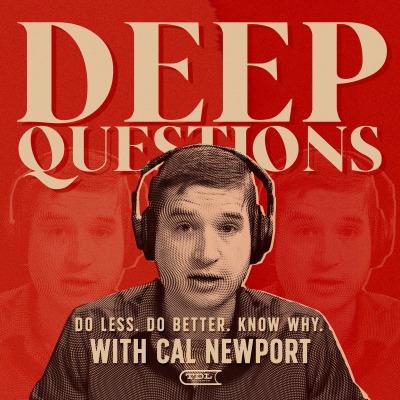
These methods are not dissimilar to the techniques Christians have always used, to be present to the life of God. The world of time-management uses inhuman jargon like “maximization” and “productivity” and “efficiency.” It encourages sometimes the taking of rather rote and mechanical actions around those concepts. In and of itself this can seem bloodless.

Other titles include Atomic Habits, by James Clear The Seven Habits of Highly Effective People, by Stephen Covey and Getting Things Done, by David Allen as well as time-use strategies like “ The Pomodoro Technique,” the “Bullet Journal” and numerous others.Īll of these, in one way or another, are tools to get us to maximize, well, everything.
Cal newport keystone habits full#
The book, whose full title is Deep Work: Rules for Focused Success in a Distracted World, is a classic of the human efficiency, time management, life-actualization industrial-complex. Cal Newport wants you to drop the toner ink and get out on the streets.

Planted firmly in the age of instant messaging and social media, it could easily have gone in the direction of one of many social commentary books scolding us about our infotainment culture.īut Newport sticks with traditional, even mundane business-book type goals. His book is sharply drawn, engaging and wise. The best “time maximizing” methods can lead us to a space where God can maximize our souls and inhabit everything we do.Ĭut to 20 years later, 2016, and Cal Newport releases Deep Work, a book about negotiating your career in an age sodden with distractions, from endless appointments and meetings (and scheduling appointments and meetings) to temptations from the screens that surround us on every side. Remembered that engaging people and their causes was the exhilarating part of my job. As soon as I left the office, roamed the twisty backstreets and entered people’s homes, I always remembered that. It was like I was avoiding that which deep down I really wanted to do. Instead I lingered on the second floor above Dorchester Ave. This was the heart and struggle and joy of the work. All in the service of helping the good citizens of Dorchester fight for safer streets, fair housing, good jobs. There I would knock on doors, survey concerns, join up members, corral people into a meeting. Prepping probably could have been done in 30 minutes, and then I could have grabbed a clipboard, hustled down the stairs and been out in the neighborhood. I stayed in the office that long each morning because I wanted to. What I did in that stretch of time before going out into the neighborhoods I don’t exactly recall: filing, sharpening pencils, loading ink cartridges into the copy machine? The strangest part is that this exile was of my own volition. But each morning I was stuck in the ACORN office for three hours, preparing for the day.

It was 1994, I was 22 and a community organizer who was meant to be out on the streets of Dorchester. In the fall of 2022, he launched a dedicated online portal,, to organize the various digital media he produces related to the major themes of his work.I was swaddled in blue flannel, brown cutoff shorts and a bundle of ideals and exiled to an office one floor above a plagiaristic Boston pastry shop (“Dippin’ Donuts”). He’s published a popular blog/newsletter since 2007 and more recently has branched into podcasting and video. In addition to his traditional book and article publications, Cal has also been an enthusiastic supporter of digital media.

In 2012, he transitioned into the world of idea writing with his fourth title, So Good They Can’t Ignore You, which challenged the conventional career wisdom to “follow your passion.” This was followed by his Technology and Society trilogy: Deep Work (2016), Digital Minimalism (2019), and A World Without Email (2021), which combined his roles as an academic technologist and popular writer to examine, for a broad audience, the impact of technology on the quest to live and work in meaningful and deep ways. In recent years, his magazine work has been focused mainly on The New Yorker, where he became a Contributing Writer in 2021.Ĭal’s early books focused on student advice. He’s also a frequent contributor to major print publications including the New York Times, WIRED, and Outside. He went on to publish seven books (and counting), which include multiple New York Times bestsellers, have been translated into over 40 languages, and have cumulatively sold over 2,000,000 copies worldwide. Cal signed his first book deal with Random House soon after his 21st birthday, while still an undergraduate at Dartmouth College.


 0 kommentar(er)
0 kommentar(er)
